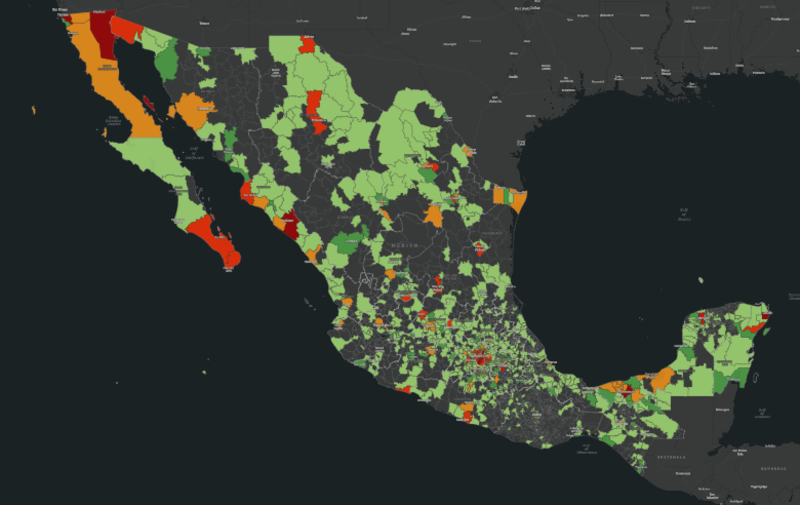Do you support your local response and recovery plans? In Mexico City at least, it’s all very fucking weird.
![Illustration for article titled [Politics]](./xr0xdazbmqjqquvqmojv.jpg)
We’re the worst performing region in the country, and things are further complicated by the fact that Mexico City’s Metropolitan area covers two states governed by opposing parties. Famously, Mexico City authorities allowed the Vive Latino concert in mid March, where 70,000 people congregated over multiple days. A police officer that was securing the event reportedly died of covid-19 a couple of weeks later.

The other very large metro areas are entirely inside their state and have also been the better performing areas in the country. Guadalajara and Monterrey (both comprised of multiple municipalities but entirely inside a single state) have outperformed other metropolitan areas, specifically Puebla, Cancun, Culiacan and Tijuana which have been the most heavily affected after Mexico City. States with more restrictive policies (Jalisco and Nuevo Leon) have outperformed less restrictive states. Meanwhile Sonora applied the most restrictive policies the quickest and is now one of the least affected states despite sharing a border with Baja California (heavily affected), Chihuahua, Sinaloa (heavily affected), and Arizona on the other side of the border.
Mexico City’s government will respond to the economic crisis by loosening construction regulations (a U-turn in policy by the Mayoress), and also giving zero interest loans to formal and informal businesses in parallel to the same program by the federal government. The crisis will hurt the capital particularly harshly because the federal government (seated in the capital city, duh) will cut salaries, reduce structural complexity, and also use the downturn to find ways to diversify their location (one of Lopez Obrador’s dreams was to move federal bureaucracies across the country to spread their economic impact). Estado de Mexico on the other hand also announced some economic recovery plans but, both state governments in charge of the most populated metropolitan area in the country seem lacklustre.
In the end, it seems like most of the rebuilding will fall upon the federal government and the central bank. However, states have also been distrustful of the government’s response... to the point that it is rumored that 21/32 states will sue the federal government to break the Federal Fiscal Pact. It’s worth noting that those 21 states are all governed by the opposition parties and that governors, universally, have a lower approval rating than the president.
In Mexico, the FFP was a pact signed by state and local governments with the federal government to relinquish their authority to charge VAT, corporate and income tax. This simplifies the tax structure and reduces the likelihood of fraud, but also means that richer states like Nuevo Leon, Mexico City, and Jalisco (and the richer municipalities within them) relinquish most of their fiscal autonomy to the federal government, which redistributes their wealth to poorer states like Guerrero or Chiapas or directly uses it through federal programs. For 21 governors to be considering it’s time to break it or at least modify it speaks of their distrust of the fed’s handling of taxpayer money.
The Mexican government’s plan is simple: do nothing. Most of the measures have been placed by the central bank and by using existing tools like the IDB’s direct credit line with the Treasury. Lopez Obrador will keep investing in Pemex’s rescue and in Dos Bocas’ refinery, the new-new Mexico City airport and the Isthmus and Yucatan Peninsular train networks. Alongside the key infrastructure promises, Obrador will also continue funding the federally backed internship program and the reforestation program; two programs that take federal money and directly distribute it among participants. He claims that in the next nine months his administration will create two million new jobs, however, he did not reveal how or if those jobs will be in the public or private sector.
It’s worth adding that this week the Federal Electoral Institute dictated that the few government aid cheques that will go through cannot bare Obrador’s signature, as it breaks electoral laws. A mid term election in Mexico is scheduled for July of 2021, along with a recall election on President Obrador later that same year.
So, it seems like this crisis is not only going to be possibly worsened by our limited resources, but also by political infighting that seems to further escalate tensions between the people and the different governments that surround them. The only promising sign is that in March 340,000 people lost their jobs; and while we don’t have the figure for April yet, it’s a significantly smaller figure than in the US. How come?
Well, the government has been blackmailing businesses to keep employees in the payroll (paying income, payroll, and healthcare taxes) even though they’re losing money due to the sanitary restrictions and the reduced economic activity. It’s worth keeping in mind that in Mexico there is no unemployment insurance, except for in Mexico City. However, Mayoress Sheinbaum promised to sue or otherwise negatively affect a list of corporations that fired some of their workers in the capital. At the Federal level the President also announced that he would reveal the names of businesses that owed the most taxes to the country if they did not start paying up.
So... Yeah. that’s where we’re at.